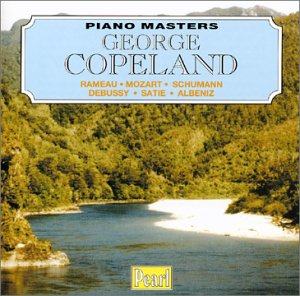Copeland was regarded by many as one of the leading
Debussy interpreters. Born in Boston in 1882 he first met the composer
during the course of Copeland’s European tour of 1911 (though he’d begun
playing Debussy’s music much earlier). The composer said that "I
never thought to hear my music played so well in my lifetime" but
as with all such endorsements other pianists proved equally laudable
exponents (Grieg was similarly effusive concerning Arthur de Greef but
he happily and equally praised Grainger and Eisenberger). Apparently
Copeland included one piece of Debussy’s in every recital he gave between
1905 and 1963 – a remarkable and doubtless unique homage – but he was
also known for his playing of Ravel, Falla and Nin. His concerto engagements
seem to have been as good as non-existent – Donald Manildi’s notes tell
us that he performed only two works, Nights in the Gardens of
Spain and Mozart’s Concerto K482. Which is taking scrupulousness
to the limits of asceticism.
What makes this release so full of interest is not
simply the Debussy but also Mozart and Schumann – not otherwise commercially
recorded by Copeland (Pearl have released his commercial Victor discs
– GEM 0001 - and I have to say that on balance they are significantly
preferable to these, despite the considerable amount of compelling pianism
on view here). His Rameau for example is rather charming and though
the Mozart Fantasie in C has its moments – primarily those of clarity
– the main impression that remains is of a certain pedestrian heaviness
in his approach. Faschingsswank aus Wien is reasonable – but
we’re not talking Magda Tagliaferro class here, to take a supreme French
Schumann stylist. The Allegro is rather circumspect but the Romanza
stands out as genuinely withdrawn and coloured with delicacy. And whilst
the Scherzo isn’t quite note perfect it is full of an animating wit
and the Finale drenched in the kind of clarity that derives from a logical
intelligence. When it comes to Copeland’s Debussy we can hear several
important components of his musicianship – strength and clarity in the
Prelude of the Suite Bergamasque, crisp rhythm and colourfully graded
chording in the Menuet and a very cool Clair de lune – aloof and really
rather indifferently phrased. And yet Et la lune descend sur le temple
qui fut is marvellously burnished, Feuilles mortes resonant
with the most introspective chill. His sole Satie is attractive and
despite some waywardness and finger slips Albéniz’s Seguidillas
has real energy.
Originally recorded on tape – or in a couple of cases
on lacquer discs – Seth Winner has done a fine job with edits and surface
noise. And if these performances do not make a cast iron defence of
Copeland’s Debussyian credentials these rare sides are handy adjuncts
to the commercial Victors and offer a glimpse into the otherwise little
explored hinterland of late Copeland.
Jonathan Woolf

